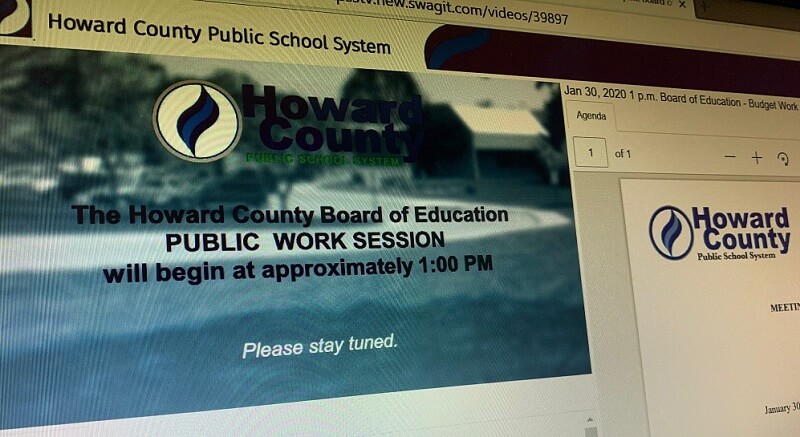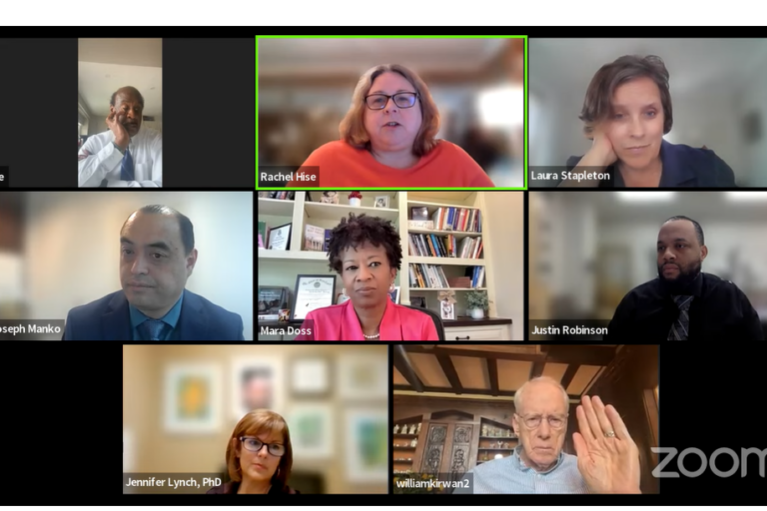Opinion: Is Law Granting Voting Rights to Howard BOE Student Member Constitutional?

Litigation recently filed by two Howard County parents raises an interesting question: Is the state law granting the right to vote to the student member of the county’s board of education constitutional?
It is, of course, equally relevant – and perhaps at the heart of the suit – to also ask if it is sound policy to allow teenagers to vote on such complex and controversial issues as setting school curriculum and policy for the Howard County Public School System, recommending support for or opposition to state and county legislation, and most germane to the pending case, when to let students come back to school for in-person instruction, even under a hybrid format.
Howard County and a handful of other Maryland jurisdictions are among the relative few in the country that permit their student school board members – in Howard County’s case, a regularly enrolled public high school junior or senior – to cast binding votes.
Overall, 20 of the 24 local school systems in Maryland have statutory provisions for student members on their school boards. Of those, 13 have nonvoting student members, six have student members with limited voting rights, and one – Anne Arundel County – has a student member with full voting rights.
The authority to cast a binding vote was first conferred upon a student board member in Maryland when, in 1975, the General Assembly passed, and then-governor Marvin Mandel signed into law legislation granting the Anne Arundel County student board representative full voting rights.
To this day, the Anne Arundel County student board member is the only member of a local school board in the nation to have that power. Anne Arundel’s student member was even elected to serve as the board’s vice chair in 2019.
Over the years, other Maryland jurisdictions followed suit. Montgomery County bestowed the right to vote on its student board member in 1989, Baltimore County did so in 1993; Prince George’s County in 1995; Baltimore City in 2001; Howard County in 2007; and Harford County in 2012.
More recently, legislation allowing the student member on the Frederick County Board of Education the right to vote failed to pass the General Assembly in 2017 and 2020, and on Nov. 23 the Charles County Board of Education voted by a 6-0-1 margin not to support legislation giving voting privileges to its student member. In 2014, a key committee in the Maryland Senate voted down a measure to roll back to some degree voting rights for the student member on the Anne Arundel County school board.
There are several obvious upsides to having student voting members on local school boards but regardless of those virtues the laws establishing those positions are ill-conceived and short-sighted and the pending Howard County lawsuit highlights why they are also likely unconstitutional.
By state law, all members of the Howard County school board must be elected, which theoretically makes incumbents more accountable to county voters. Additionally, Maryland’s Constitution requires that each voter must be at least 18 and registered to cast a ballot. Yet, the 2007 law giving the Howard County student board member the right to vote establishes an election process in which unregistered ineligible voters — sixth- to 11th-graders — cast votes to elect a candidate to who is probably not a registered voter, a qualification established by Maryland law and its Constitution for all who run for office. (A little known 2010 Maryland law permits 16-year-olds to register to vote but not actually cast a ballot.)
It should be underscored that results of the student election are binding; the board of education’s primary post-election role is confirming the election results before swearing in the student member elect to serve a one-year term and cast votes on important issues. This makes the elected student member largely unaccountable to eligible voters, leaving little to no recourse for adult resident voters except to litigate.
The lawsuit also points out that Maryland’s Education Code precludes anyone subject to the authority of a local school board from serving on such a body to avoid a conflict of interest like a teacher member pushing for unreasonably large salary increases or a student member voting to cancel standardized tests or final exams.
Lastly, adding student voting members to the boards of education in Baltimore City and Anne Arundel, Baltimore, Harford, Howard, Montgomery and Prince George’s counties has created policy making bodies with an even number of members, leading to – at least in Howard County – tie votes, resulting in gridlock and stalemate on key issues.
Maryland lawmakers and other policymakers who simply dismiss the legal action as frivolous litigation driven by disgruntled parents send the wrong message to the Howard County Board of Education’s student voting member and the student members with voting rights on the other school boards. The single best and most lasting lesson student board members learn is the importance of process in policymaking.
By simply scoffing at the lawsuit and continuing to run rough shod over the state constitution, and not trying to properly address the legitimate issues raised in the complaint – through a constitutional amendment that will ultimately go to the voters for ratification – the adult legislators are telling the student policymakers that breaking or ignoring the rules is OK if you agree on the issue at hand or think you have the votes.
— GENE HARRINGTON
The writer lives in Ellicott City.




 Creative Commons Attribution
Creative Commons Attribution